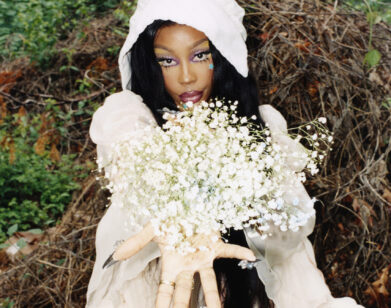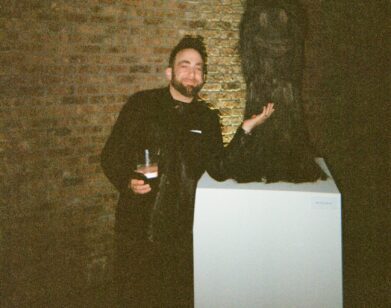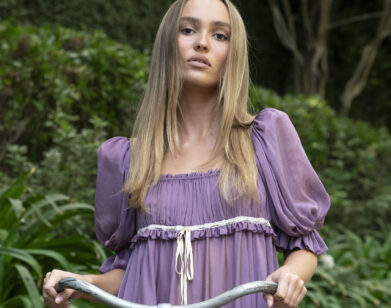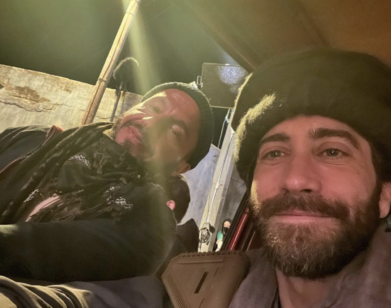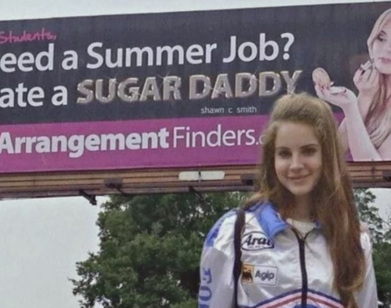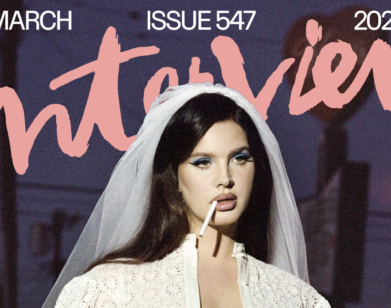COVER
Natalie Portman Tells Jenna Ortega How to Survive Hollywood
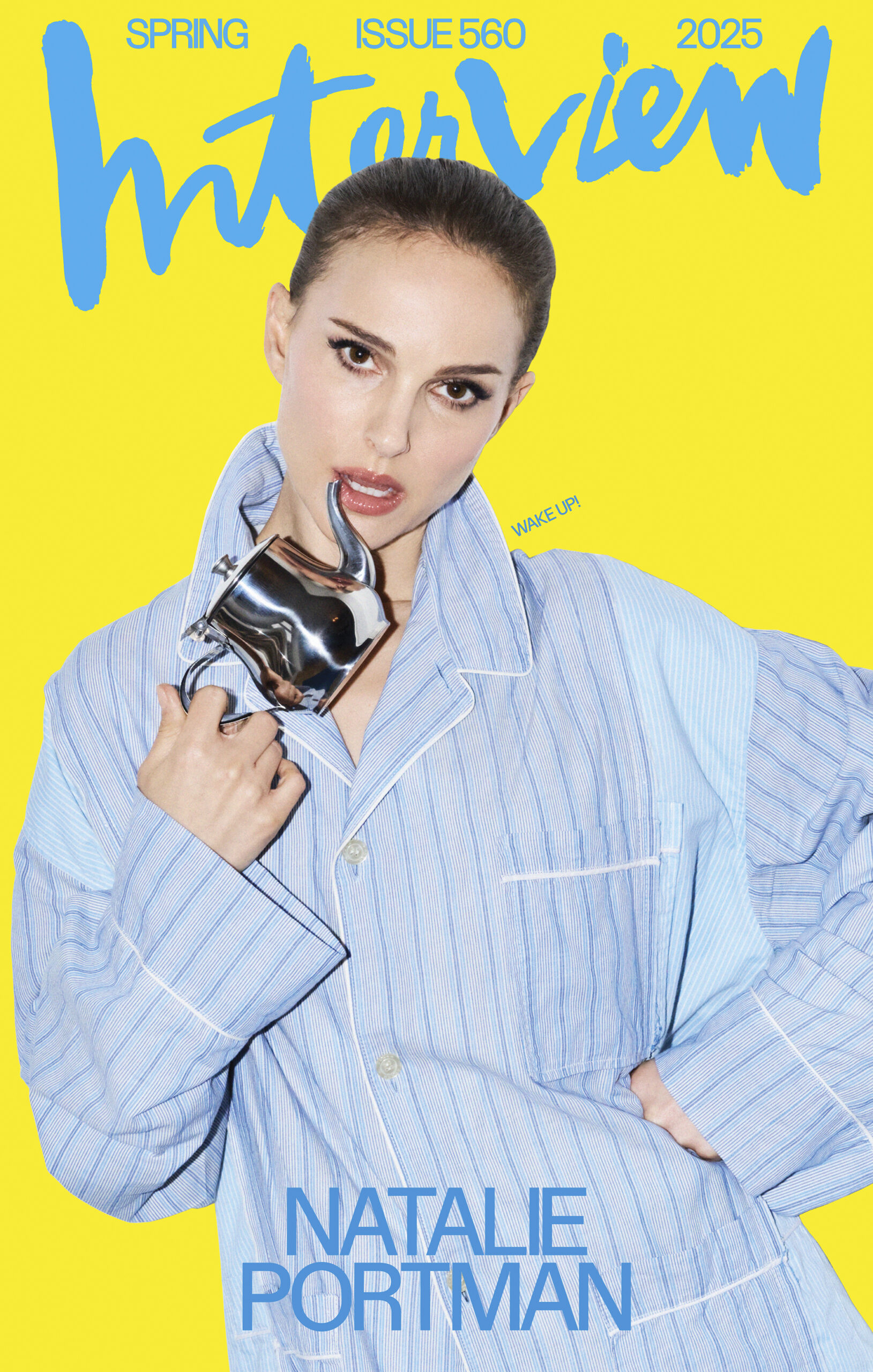
Natalie Portman wears Top and Pants Coach.
It’s not exactly “mommy mode,” but when Natalie Portman greets a jittery Jenna Ortega on Zoom, she immediately puts her younger costar at ease with the effusive warmth that comes naturally to a seasoned actor—and mother of two. At 43, Portman, who divorced her husband last year, is keeping busy. She just wrapped shooting The Gallerist alongside Ortega, and ignited a bidding war when she signed on to star in Lena Dunham’s Good Sex. This spring, she appears in Guy Ritchie’s Fountain of Youth, a globetrotting adventure that came at just the right time (and will be streaming globally on Apple TV+ come May 23rd). “You want to find that joy and lightness and humor in your work when things are harder at home,” the Black Swan star tells Ortega. And in conversation, the notoriously private star reveals a well-kept secret: With the right person, she’s an open book.
———
MONDAY 6:30 PM FEB. 17, 2025 PARIS
NATALIE PORTMAN: I’m so glad to get see you. We said bye a week ago and now we get to say hey again.
JENNA ORTEGA: I’m in a bit of a different position though. I don’t think I’ve ever had to do this before.
PORTMAN: I’m pretty certain you’re going to have no problem. You’ve done many more complicated things. [Laughs]
ORTEGA: By the way, I saw [Fountain of Youth]. So, so good!
PORTMAN: Thank you!
ORTEGA: What was the shooting process like? Did you get to go to Egypt?
PORTMAN: It was so fun. I got to go to Egypt and Vienna, and then most of it was shot in London. It was the best people and a really fun process with Guy, too. He reworks everything on the day—I’m sure you’ve had experiences like that too, where you’re feeling your way through it together and it’s really creative.
ORTEGA: Definitely. I didn’t know that he worked like that because he does a lot with action and movement—you’d think that it’s so much more rehearsed than it actually is. The comedic timing was really sharp.
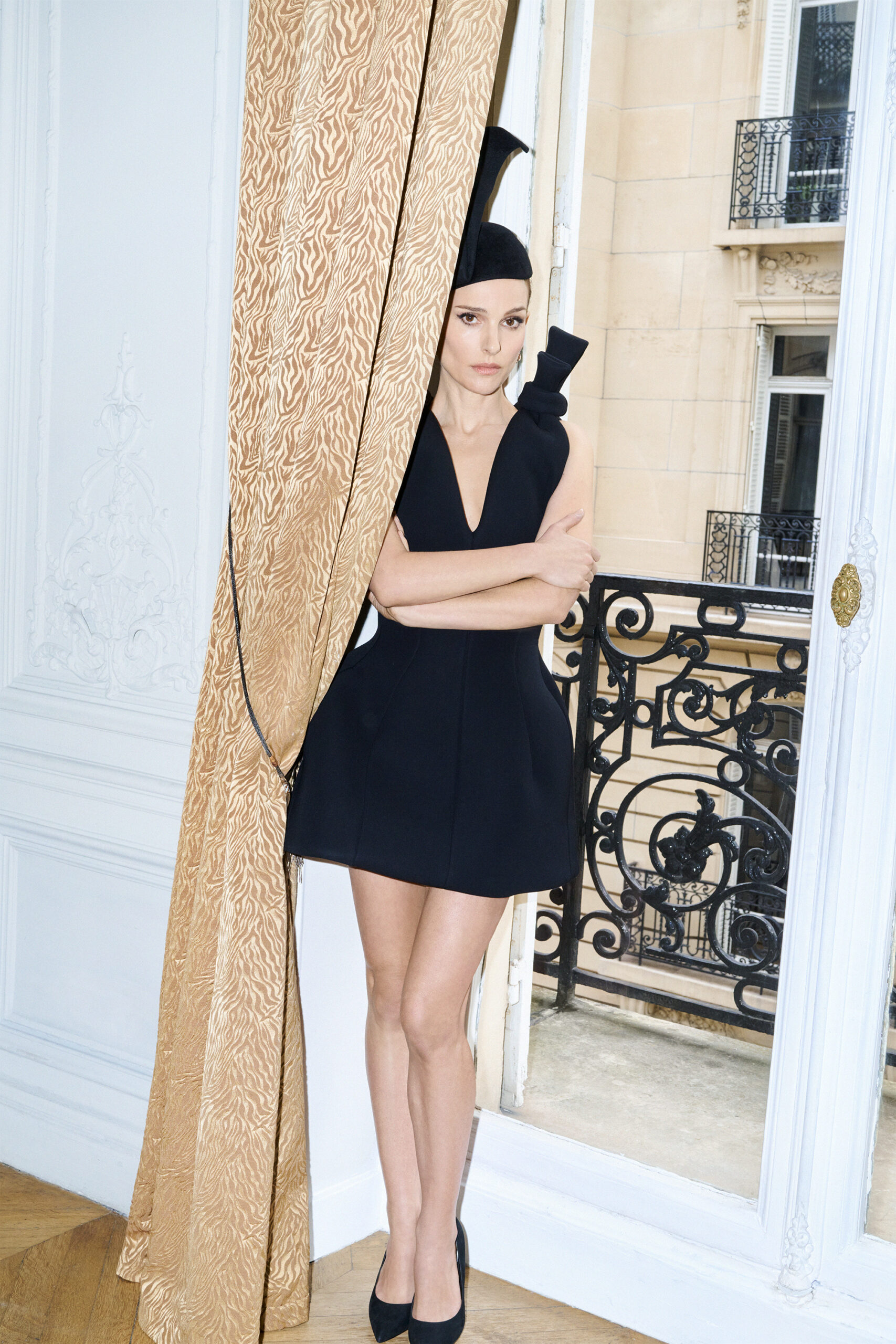
Dress Acne Studios. Vintage Pierre Cardin Hat Stylist’s Own. Shoes (worn throughout) Dior.
PORTMAN: Yeah, it’s surprising. He’s got such a good ear for quick dialogue, and his team is such a well-oiled machine. They know how to work together and shoot all the action so beautifully.
ORTEGA: Right. When you’re choosing these jobs, is it more about the character or the script? You’ve got so much variation going on right now.
PORTMAN: There are things that come at certain times of your life. I learned from actresses that came before me who said, “It’s important to go for joy.” There’s moments in your life where it’s really meaningful to have a work experience that just envelopes you in happiness, and this was one of those.
ORTEGA: Do you feel like your roles and your personal life tend to intertwine like that?
PORTMAN: It doesn’t always work out, but I’m drawn to things because of what’s happening in my personal life. It’s actually counterintuitive because to do emotionally difficult material, my real life has to be pretty chill, no major issues. You want to find that joy and lightness and humor in your work when things are harder at home.
ORTEGA: That makes a lot of sense. Do you think with these comedic roles, it’s a bit easier to leave characters just because there’s less pressure, less dwelling?
PORTMAN: I think it has more to do with whether it’s a charactery part or whether it’s something closer to who I am as a person. When I do a character, if it’s a voice, or gestures, or a way of walking, or an accent, that’s harder to shake just because you have to practice it so much before. Have you had a hard time shaking a character before?
ORTEGA: I’m like you. It’s more so when it’s a physical overtaking. That or if I’m really enveloped in the story. If it’s something that’s very meaningful to me, I don’t want to let the project go. I’ve had characters I grew really fond of and miss. Sometimes I’ll hop to the next job and have to really work on shaking previous habits. I try to wake up in my hotel room and do things differently to get rid of that stench.
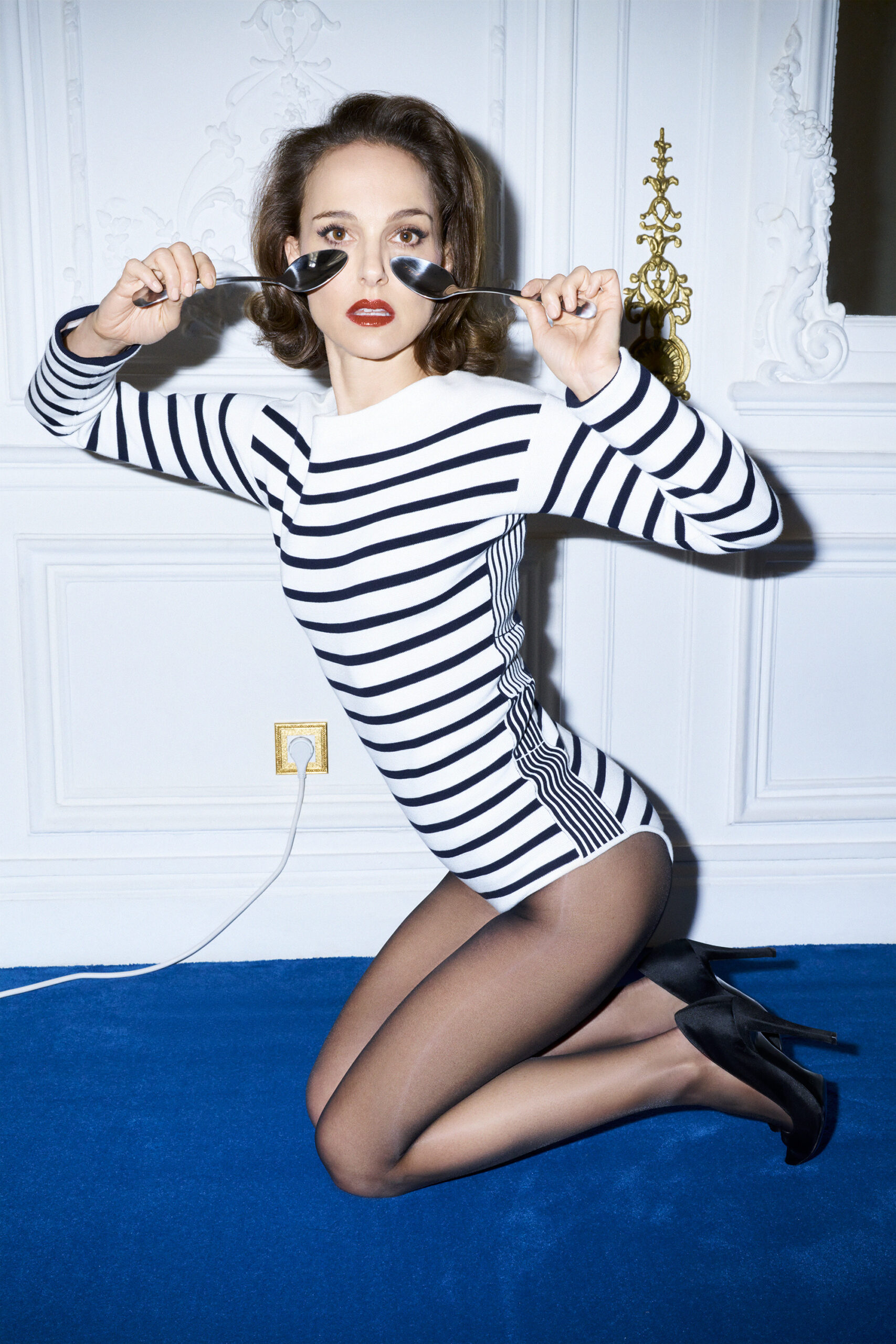
Bodysuit Dior.
PORTMAN: Yeah, it’s smart to change your routine. I haven’t tried that.
ORTEGA: Somebody told me to feng shui my place. Sometimes you hear things like that and you think that’s a little silly, but it’s so refreshing. It’s like if you got a new coffee table and you think, “Oh, wow, this is so exciting.” But I hope you’re more excited about things in your life right now other than coffee tables. [Laughs]
PORTMAN: Well, coffee tables are always exciting, but yes, many things to be excited about.
ORTEGA: What is something in life now that makes you excited? It could be work-related, personal, whatever you feel.
PORTMAN: My kids are always a source of excitement, because you just see them develop into the individuals they are. And also, I’ve been spending a lot of time with my friends, with their kids and my kids; that’s pretty fun.
ORTEGA: Right. Something that you said when you were talking about your kids made me think—obviously you’re a child actor. I’m a child actor. We all have this kinship. As soon as someone mentions that they were a young actor, you start to look at them differently. Do you think that having your children helped you find a bit more of a balance? Because it can be so hard to not have this job take over your life.
PORTMAN: First of all, I totally agree on that connection as child actors because there’s a lot of things people believe about us that I don’t feel are necessarily true. And yet it’s a very unusual, unique experience that not a lot of people share. But having kids, that wasn’t really my motivation. I was just excited to have kids, and with a person that I was in love with. But it’s really important to have people in your life who keep you on the ground.
ORTEGA: Is that something you’ve ever struggled with? When do you think that understanding occurred?
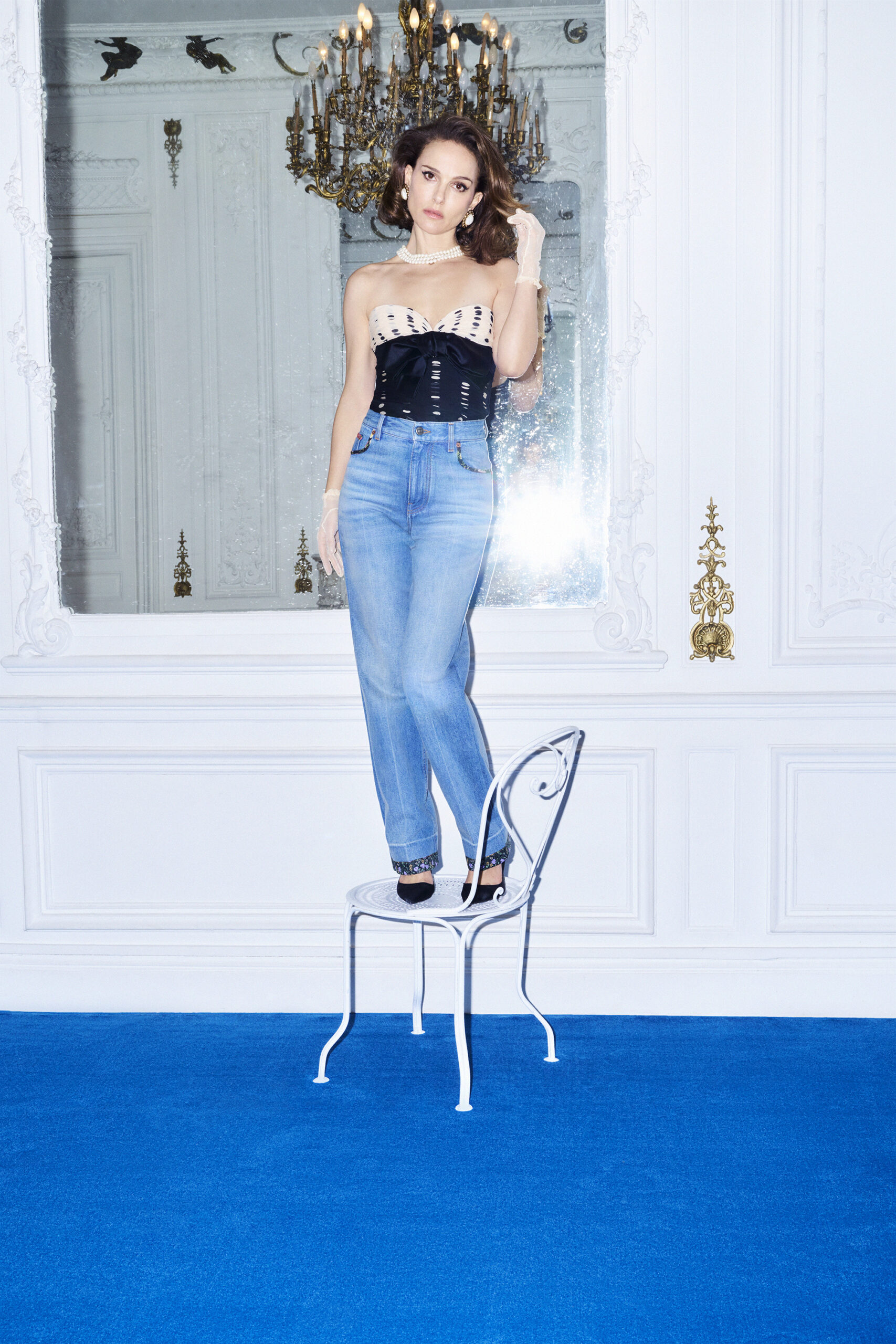
Top, Jeans, Earrings, Necklace, and Gloves Valentino.
PORTMAN: My parents always kept my feet on the ground, but later I had friends who would tell me something that no one else would, or they’d help me navigate the world. Everyone’s so nice to you when you’re an actor and it’s sometimes hard to see the signs that someone’s not a great person. When you have friends that can be like, “Oh, they were really nice to you, but they didn’t even say hi to me,” it helps you navigate when you’re being pampered all the time. Also, a lot of people just turn into yes-people, which is not a good way to be a person in the world. You need a little feedback like “It’s not cool when you do this” to understand how you can be the best possible person.
ORTEGA: Definitely. I’m always so impressed by you. You’re in a very unique position and you have been for a majority of your life, and it’s scary and it’s overwhelming, but not only have you handled it so gracefully, but you’re just so human. It’s so refreshing to be on a set and have that energy.
PORTMAN: You’re so sweet. Thank you.
ORTEGA: I’m serious, especially with someone who is number one on a call sheet—that’s so influential as to the way that people operate and even carry themselves on a set.
PORTMAN: I feel the same about you. I’ve told you before, so excuse me for saying it again, but it makes me feel so good about the next generation that you’re leading it, because you’re so, so talented and such a good human and so kind and so smart. When anyone complains about young people these days, I’m like, “No, no, no. They’re more special than ever.”
ORTEGA: [Laughs] Thank you. I don’t know how much you pay attention, but as far as the public perception of you goes, do you think it’s on the money or do you think that you’ve had a nice protective layer for yourself and you’re able to keep things just for you?
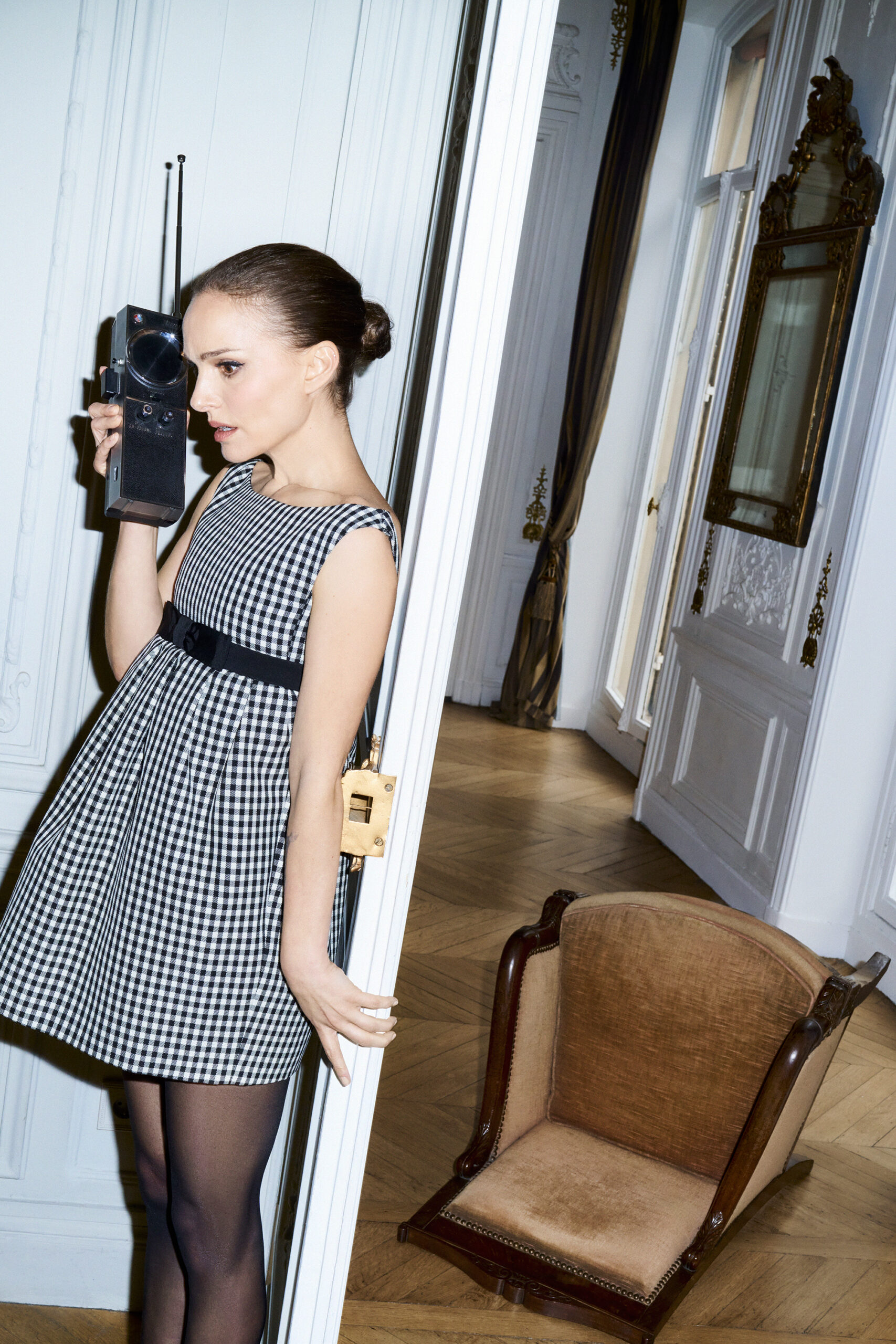
Dress Celine by Hedi Slimane.
PORTMAN: I think there’s a public understanding of me that’s different from who I am. I’ve talked about it a little before—about how, as a kid, I was really sexualized, which I think happens to a lot of young girls who are onscreen. I felt very scared by it. Obviously sexuality is a huge part of being a kid, but I wanted it to be inside of me, not directed towards me. And I felt like my way of protecting myself was to be like, “I’m so serious. I’m so studious. I’m smart, and that’s not the kind of girl you attack.” I was like, if I create this image of myself, I’ll be left alone. It shouldn’t be a thing, but it worked. But I think that’s the disconnect between me being stupid and silly in real life, and people thinking that I’m some really serious bookish person. I’m not a particularly private person in real life—I’ll tell you anything—but in public, it was so clear early on that if you tell people how private you are, your privacy gets respected a lot more. I set up a little bit of a barrier to be like, “I’m not going to do photo shoots with my kids.”
ORTEGA: That’s totally understandable. I don’t really know what that line is. I guess I’m still figuring that out. Also, with social media, everything is constantly changing. Even the way that press is handled is very different, so I think it’s hard to say how real you can be. Do you think that as the industry has changed and evolved, it has affected how you carry yourself? Or do you just keep the same levelheaded approach?
PORTMAN: There’s so much more media now, so to break through it all, you need to be noisy. It needs to either be controversial or weird or unusual or funny, but that’s made it all much more interesting. We used to do all those junkets where you have the same four questions over and over, and now they’re like, “You’re going to do a video with puppies.” [Laughs] I find that much more entertaining, and still, it doesn’t really reveal your personal life.
ORTEGA: I agree. It’s also easier to evade those questions because everything is filmed, and young people are so protective of celebrities. For the most part it’s like, “Don’t talk to her that way.” People are a bit more careful not only in media, but in our jobs.
PORTMAN: That’s a great point.
ORTEGA: We’re starting to see more women behind the scenes. Catherine [Yan, the director of The Gallerist] was saying something about this as well, where she found herself addressing people as “man” or “sir” when she didn’t mean to, because she was so accustomed to only being around male crew members.
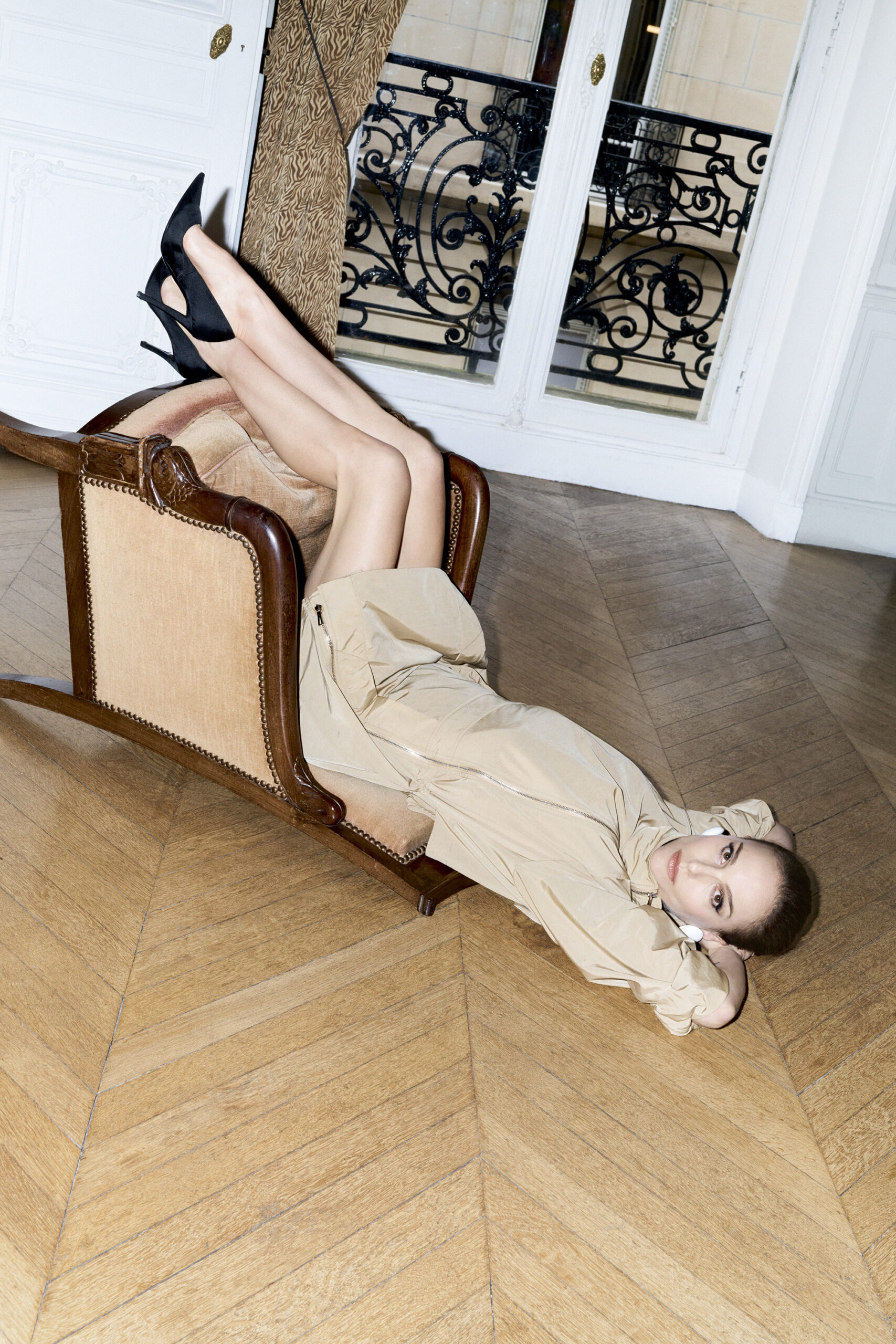
Jacket Hermès. Earrings Stylist’s Own.
PORTMAN: Yeah. It’s still so largely male, but the conversation around it has definitely helped a lot. I feel like hair and makeup was always the female space. It’s quite stereotypical, but it’s true. So there was always this pocket on set where, as a kid, I felt safe and surrounded by women, and as I’ve gotten older, it’s only become more and more important for me to work with women. Often you’d be cast as the chick in the film, or there would be other women in the film but we’d never have scenes together.
ORTEGA: Yeah, there’s something really, really heartwarming, but also simultaneously devastating, anytime I speak to actresses from previous generations, just because their experience is so jarringly different. Not everybody has that community that you talk about, or the friends or the parents. So it’s nice to see how much it’s changed because I’ve been very fortunate in my upbringing, in our line of work.
PORTMAN: That makes me really, really happy to hear.
ORTEGA: Yeah, it’s really wonderful. Do you find that actors or characters now are more complex and people are better at handling the complexity of women’s lives? Or do you think that there’s still too many tropes?
PORTMAN: There are definitely tropes, and I think at each phase in my career, there was a different one that I was like, “Oh, I’ve got to avoid this.” Obviously there was a long Lolita phase, then there was the long “chick who helps the guy realize his emotional thing” phase for about a decade. And now I feel like it’s “mothers who have harmed children,” which is just like, I cannot emotionally go there. So yeah, there’s a lot of the same tropes, but those are always helpful for pinpointing when something really special comes through. It really stands out when you get something complex and beautiful and original.
ORTEGA: I agree. I was listening to you talking about guiding the man through really emotional complexities for a decade, and I thought, “Fuck, no!” [Laughs] But one thing I do appreciate about our job is that you never get bored. Is there anything in this line of work that you’ve learned and maybe wouldn’t have had you not been doing what you’re doing?
PORTMAN: I mean, there’s certainly many experiences I wouldn’t have had. I got to do beekeeping for a part. I’ve gotten to travel to really interesting places and meet interesting people, and I’ve gotten to play a rock star and an astronaut and a ballet dancer. It’s a way to get to live a lot of different lives. And yeah, I think there’s also a lot of different relational things that I’ve gotten out of doing emotional work on characters—about the power of stories in building identity, about the importance of attention in love, and the choices you make.
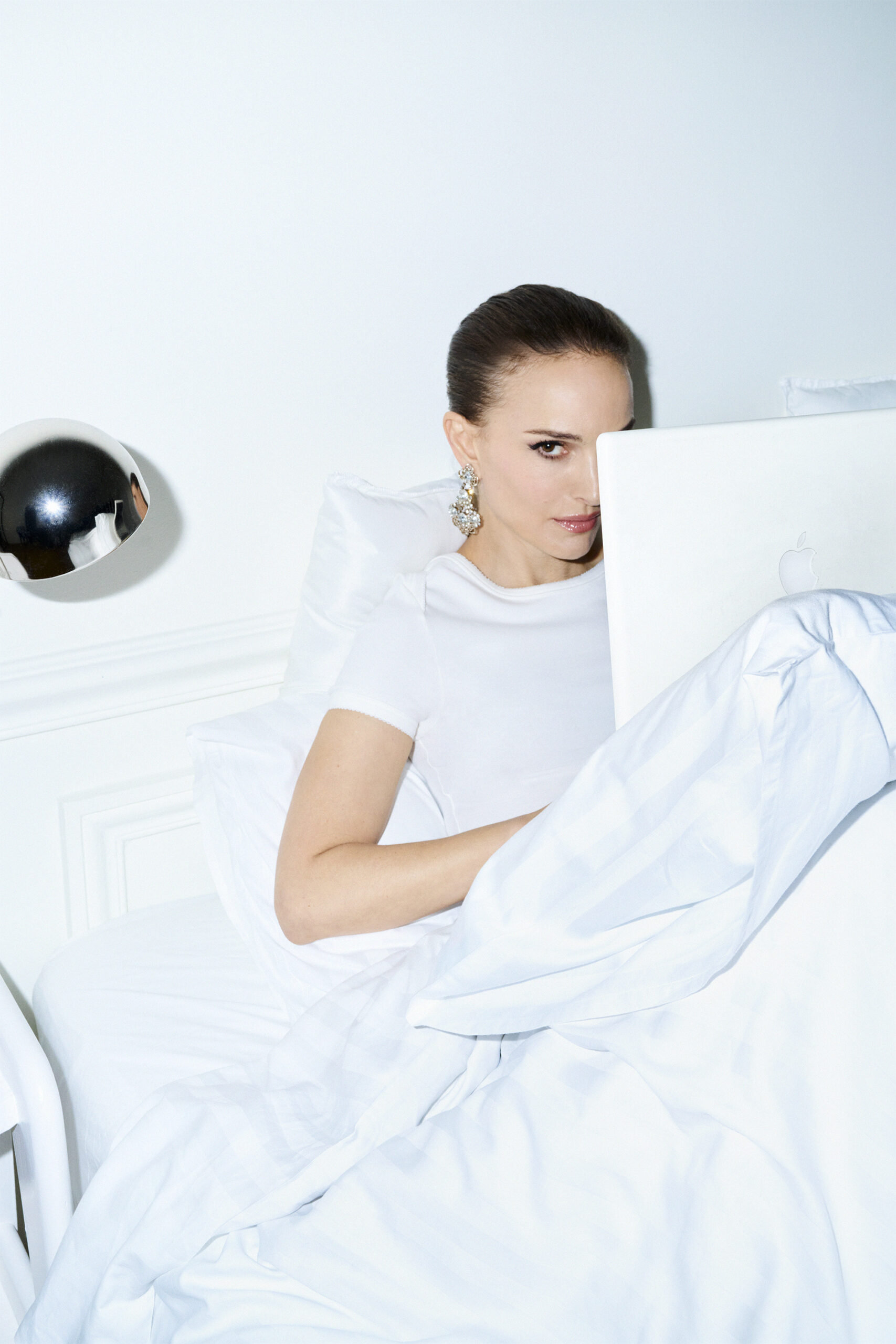
Bodysuit Miu Miu. Earrings Kentshire.
ORTEGA: Right. But do you feel like when you do these jobs, there has to be a bit of you in it? Or do you find yourself in the character?
PORTMAN: I don’t know that it’s always the same for me. I always hate the question of “How do you relate to your characters” because I’m usually most interested in playing someone who’s quite different from me. Because if it’s like me, I’d rather just live my own life. But I think, because I have an aspect of my life that’s quite logistical now—I’ve got two kids who are in school and I want to spend as much time with them as possible—sometimes I take a job that is great, but isn’t necessarily like, “My stomach must do this part,” but it works with my life. I always have to connect to it somehow, but I’m not always choosing it for that reason.
ORTEGA: I feel like that’s a really healthy thing to do. A lot of people forget that ultimately it is a livelihood; it’s what you do to pay the bills, so there’s an aspect of it that does have to be practical.
PORTMAN: Yes.
ORTEGA: And like I said earlier, it’s so easy for it to pull you in every direction if you’re not putting your foot down and taking a stand for yourself.
PORTMAN: Absolutely.
ORTEGA: But I feel like I learn a lot from you, just the way that you manage your life. When I was a child actor, I did the kid shows and the kid roles, so it was a very different experience. Something that I actually don’t know about you, and this is a very basic question, but why did you know about acting so young and why was that something that compelled you?
PORTMAN: I’m curious the same about you. Do any of your siblings also act?
ORTEGA: No, I’m the most expressive person in my family. Everybody is very shy. I have a brother who’s an accountant, and my sisters are nurses, a 911 dispatch officer. Very normal jobs.

Bodysuit Miu Miu. Sunglasses Ray-Ban. Earrings Kentshire.
PORTMAN: So how did you figure it out? Mine is easy. I grew up on Long Island and because it’s close to Manhattan, a lot of kids my age who were at dance school with me were auditioning for commercials to make money for college. And so I asked my parents if I could, too. I always loved performing, and so I begged and begged them, and finally they let me meet an agent and audition.
ORTEGA: Right.
PORTMAN: What about you?
ORTEGA: I didn’t have that. When I was younger, I wanted to be a lot of different things. When you were saying that thing about an astronaut and president and this and that—that was me, genuinely.
PORTMAN: I want to see you as president.
ORTEGA: Can you imagine?
PORTMAN: Please.
ORTEGA: I say it all the time. My siblings got mad at me because I turned SpongeBob off to watch Obama’s inauguration. I was obsessed. I truly believed that that was going to be me. Also, I was very dramatic, and I thought that all TV was reality TV. I thought there were cameras in all of our homes. I’d turn on a movie or a show and be like, “Oh my god, it’s amazing that they caught this.”
PORTMAN: That is amazing.
ORTEGA: I was like, I can’t believe they caught this footage. So at 5 or 6 years old, I would walk around my house and reenact these really dramatic things and then run over and turn on the TV to see, did I make it? I had no concept of what filmmaking was. Then one day, I saw a YouTube video or something, and I realized, oh, this is all planned.
PORTMAN: Oh my god.
ORTEGA: And I could do it. They could hire me.
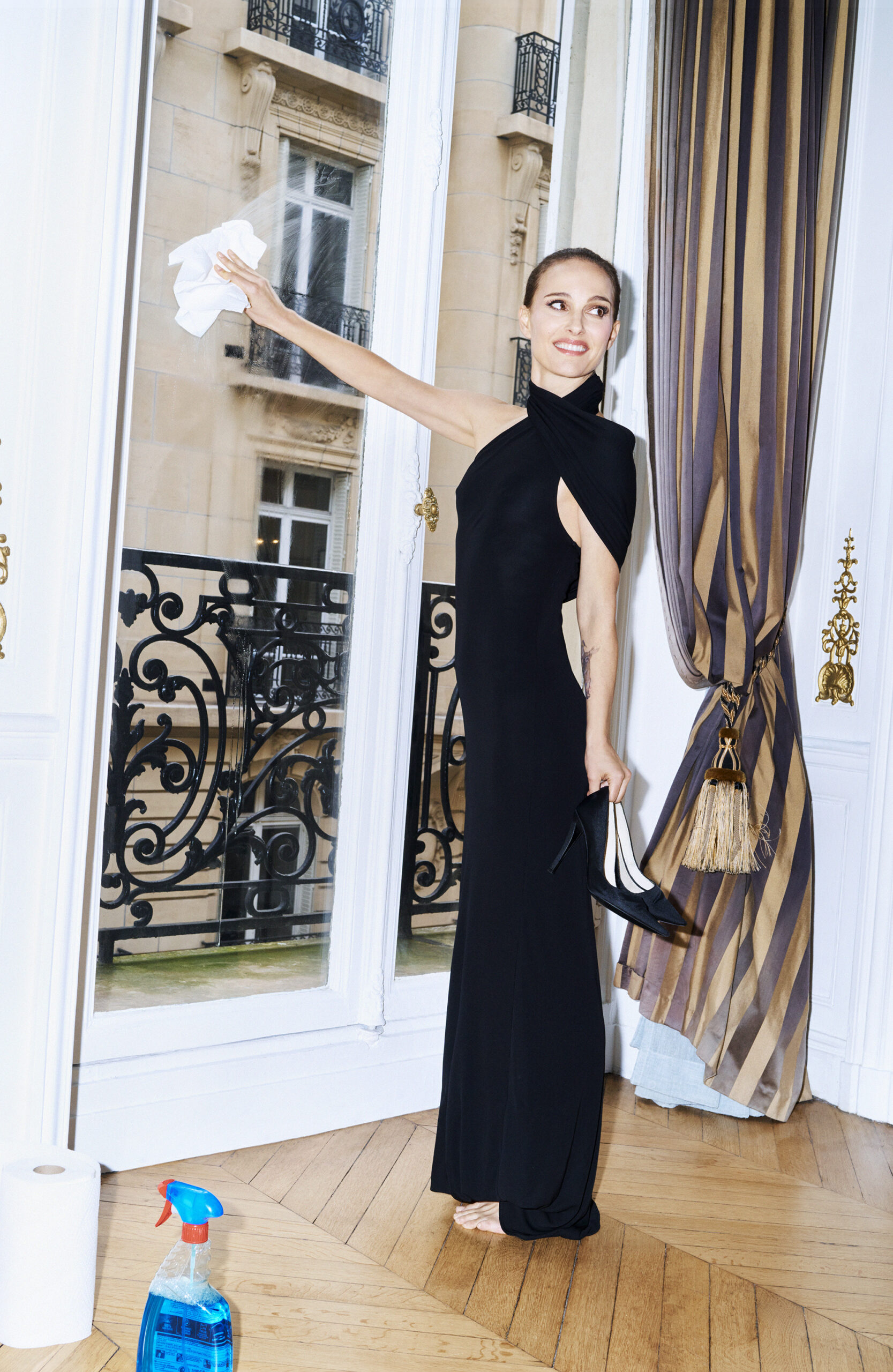
Dress Dior.
PORTMAN: That’s so funny. I love it.
ORTEGA: It just all clicked. Well, what else? I stole this coffee sleeve from a cafe and I’ve got all my notes on there.
PORTMAN: [Laughs] That’s awesome.
ORTEGA: Okay, this is a question I like. Do you feel like your relationship with ambition has evolved and changed?
PORTMAN: Yes. I was very ambitious as a kid and I would definitely describe myself as ambitious now, but it’s completely changed. As a kid, I was really interested in pleasing other people. And now, I’m very much into setting new challenges for myself, having new experiences for myself, and finding my own pleasure.
ORTEGA: That makes me really happy, and I also think that that is a good note to end on. A nice positive.
PORTMAN: Thank you so much. I love talking to you, Jenna.
ORTEGA: Oh, me too. It’s so nice to do it somewhere else, not wearing wigs and in between setups and long days.
PORTMAN: I know. Non-wig talks are great. [Laughs] Alright, well I hope I talk to you soon and have a great rest of your week, lady.
ORTEGA: Thank you so much. You as well. Take care.
PORTMAN: Bye.
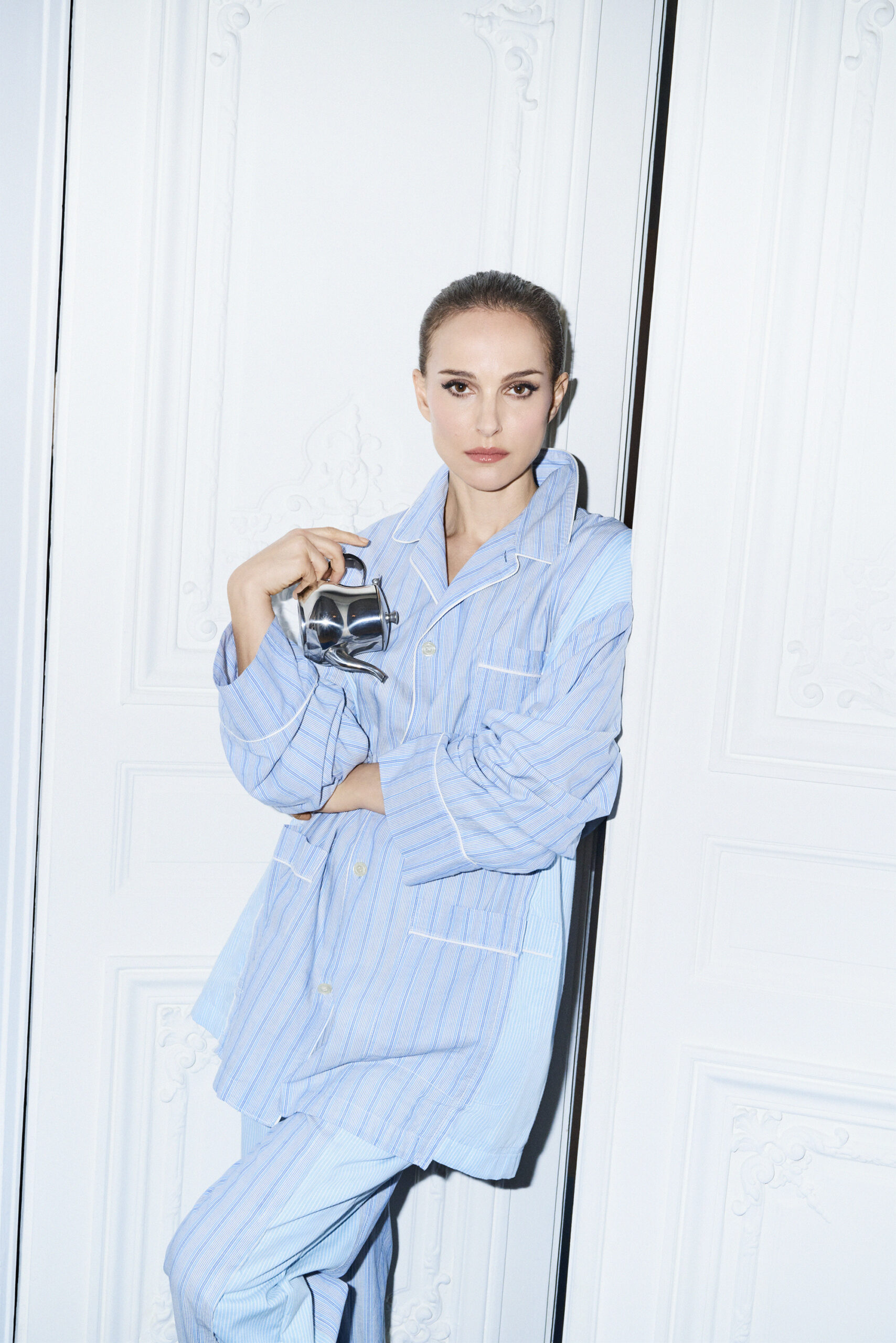
———
Hair: Philippe Mensah at Capsule Agence.
Makeup: Miwoo Kim using Dior Makeup at Tag Agency.
Nails: Sidalia.
Set Design: Manon Everhard at Streeters.
Tailor: Déborah Labartino.
Photography Assistants: Pierre Senechal, Lukas Ionesco, and Summer Henry.
Fashion Assistants: Fern Cerezo and Lisa Fulchignoni.
Digital Technician: Magnus Bach.
Set Design Assistants: Sassa Ann Van Wyk and Nogan Camille Chevreau.
Production: The Morrison Group.
Production Management: Renata Pepper.
Production Assistants: Lola Gramond and Lena Ramkina.
Post-production: Nitty Gritty Berlin.
Special Thanks: Lukas at Studio Rahlwes and Christian at Nitty Gritty Berlin.

